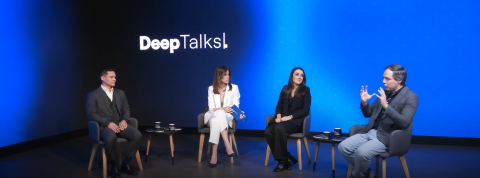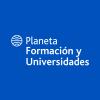
Planeta Formación y Universidades launches Deep Talks, a new format for open debate on current events
Artificial intelligence (AI) has great potential as a transformative element in education, and is only comparable to the irruption, in its day, of the Internet and the invention of the computer. This is one of the many aspects debated in Deep Talks, a new open format of Planeta Formación y Universidades to analyse current affairs from the perspective of the education sector, with a multi-specialised and international vision. Teachers, experts, and collaborators from the Planeta Formación y Universidades network of higher education institutions will debate different thematic areas to address the reality of the educational, business and social world.
The first of the Deep Talks, which has just taken place, is entitled 'Artificial Intelligence. Education and the future' and was attended by Alejandro Briceño, Professor of Innovation and Digital Transformation at EAE Business School; Miriam Martínez, Director of Quality and Director of the Master's Degree in Intellectual Property at UNIE Universidad; José Jesús García Rueda, Vice-Dean of the STEM area at The Core Entertainment Science School and Kaouther BOUBAYA, Professor of Strategy at EDC Paris Business School.
The experts from the Planeta Formación institutions and universities participating in this first conference agreed that AI has enormous potential to revolutionise education, opening up endless possibilities for pedagogical innovation. For José Jesús García, AI "is not just another new technology, but one of the most disruptive or with the greatest capacity for disruption that we have invented in recent history, comparable only to the invention of the computer machine, the computer, or the Internet".
Along the same lines, Alejandro Briceño points out that artificial intelligence represents "a paradigm shift" in the training sector, as it allows "personalisation of education". In the case of teachers, for example, it will make it possible to save repetitive tasks such as assessments or correcting exams and thus be able to spend that time on other aspects linked to student training. The challenge, for this expert, lies in how to incorporate these new tools, in whether "educational institutions are really prepared to deal with it".
Instilling in students that AI is in no way a substitute for human intelligence
Acknowledging that "its control is complicated", Miriam Martínez admits that "artificial intelligence in students is already a reality, and we as teachers cannot look the other way". The challenge facing educational institutions is, in her opinion, "to instil in students that artificial intelligence does not replace human intelligence under any circumstances". In this regard, Martínez stresses that UNIE University is already working on internal protocols to seek standardisation in the use of AI.
The three professors agreed on the need to promote critical and strategic thinking more than ever in education in order to be able to live in the context of AI, since technology also makes mistakes. They also recognised that it is "easier" for students to adapt to the AI revolution, as they have "much more internalised the use of technology". But students must be taught and, above all, made aware of its use: "We have to teach them the process of adaptation. Nowadays everything is so accessible that you have to educate them about this accessibility, you have to teach them the process of adaptation", they emphasised.
In relation to employability, they all highlighted the key role that training will play in the age of AI. In this regard, José Jesús García believes that it will be key to "have a holistic vision, an integral conception of knowledge that includes a much deeper understanding of the profession you are working in" and that the challenge at the educational level is "to raise awareness among new generations of students and future professionals that they must develop the skills of their profession and not just trust that AI will do their job".
Challenges of AI in relation to authorship of works
One of the challenges posed by AI is that of authorship and copyright of the content it generates. The lecturer from UNIE Universidad points out that "the law is still trying to provide an answer to all the legal conditions that are appearing with the use of AI", while the lecturer from EAE Business School points out that, in the university environment, "you can do a TFM with ChatGPT, and in that case, whose authorship is it?
In this regard, Miriam Martínez pointed out that "the wording of the law in Spain tells us that there is no intellectual property in AI, given that only works that arise originally from the human mind are protected. However, although this is true, it is also true that the person programming the AI algorithm is a human mind and, therefore, the legal debate on this aspect is completely open".
The common conclusion of all the speakers is that, in the face of artificial intelligence, people's critical thinking must be encouraged, an intrinsic human value that no machine can replace. The education sector must, hand in hand with experts in innovation, move forward to try to configure in advance new methods that adapt to the paradigm shift.
Deep Talks: An open and plural forum
Deep Talks is an open, plural and high-level meeting place where experts from different fields, together with representatives from the educational and business world, will discuss the great challenges and opportunities that arise in the current panorama, with a special focus on the field of training and education. This forum for reflection is an initiative of Planeta Formación and Universities and its objective is to generate a constructive dialogue that contributes new perspectives, innovative solutions and cutting-edge knowledge to the problems that concern us as a society.
